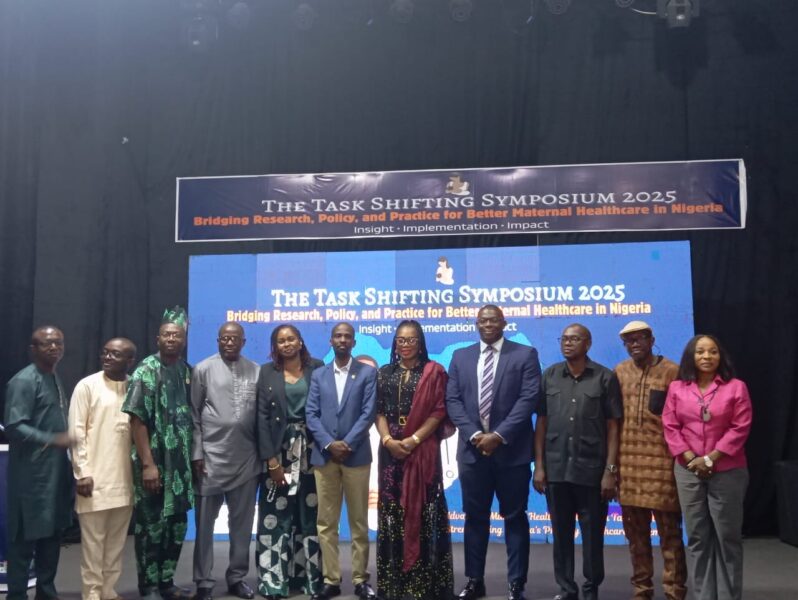2
The Mandate Secretary, Health Services and Environment Secretariat, Federal Capital Territory Administration (FCTA), Dr. Adedolapo Fasawe, has called for an urgent shift toward evidence-based decision-making and sustainable workforce reforms to tackle Nigeria’s alarming maternal mortality rate.
Speaking on Tuesday in Abuja during her keynote address at The Task Shifting Symposium 2025, themed “Bridging Research, Policy, and Practice for Better Maternal Healthcare in Nigeria,” Dr. Fasawe said Nigeria must rely on research not assumptions to strengthen its health system.
“Research has been missing in our quest to improve the health system. Research is policy-making. We can only make informed decisions based on verifiable data what works and what doesn’t not on imagination,” she said.
She commended the study being presented at the symposium, describing it as a rare example of research that reflects the realities of frontline health workers, policymakers, and development partners.
Dr. Fasawe lamented Nigeria’s persistently high maternal mortality rate, noting that most of the deaths occur in primary healthcare settings where there is limited access to skilled health workers and essential equipment.
“Nigeria still carries one of the highest maternal mortality burdens in the world, according to WHO. It is heartbreaking because these deaths are preventable,” she said.
“Women arrive at facilities and there is no skilled provider, no blood, no equipment, and sometimes no one who knows what to do. By the time they reach general hospitals, it is often too late.”
She attributed the crisis to the dire shortage of health workers at the primary healthcare level a gap worsened by the Japa syndrome, inadequate recruitment, and the reliance on volunteers.
“Some of our skilled workers are volunteering without pay. Some support staff in PHCs are not trained at all. Yet primary healthcare is the first point of contact for most Nigerians,” she said.
Dr. Fasawe reiterated that task shifting remains essential for Nigeria’s strained health sector, but she insisted it must be implemented responsibly.
“Task shifting cannot be stopped because of the human resource shortage. But it must have clear boundaries, supervision, and training,” she stated.
She praised the researchers for involving frontline workers in shaping the study’s tools and feedback process, noting that such collaboration improves policy relevance.
Dr. Fasawe also drew attention to environmental factors affecting health, urging policymakers and researchers to consider the impact of rising temperatures on human well-being.
“Health and environment cannot exist without each other. Something is happening with our weather patterns, and as scientists, we must start asking the right questions,” she said.
The FCT health chief stressed that the solutions are within reach if policymakers embrace data, invest in human resources, and prioritize maternal health at the primary level.
“We must put our heads to work and fix the system. Maternal mortality should not be normal. It is preventable,” she said.
Also speaking, Dr. Francis Postdoctoral Researcher at the University of Oxford’s Nuffield Department of Primary Health Care and the convener of the symposium, explained that the symposium disseminated findings from his doctoral study on task shifting for maternal health services in Nigeria.
The study, conducted at national and FCT levels, explored the realities faced by primary health care workers and the persistent gaps affecting maternal healthcare delivery.
“Nigeria continues to lead global charts in maternal deaths, and it is terrifying,” he said.
“Primary health centres serve the majority of Nigerians, yet they are weakened by severe workforce shortages, the Japa syndrome, and inadequate staffing levels.”
Dr. Ayomah noted that despite its challenges, task shifting remains unavoidable given the extent of Nigeria’s human resource deficit.
“Ideally, we shouldn’t be relying on task shifting but we can’t do without it,” he said.
“The key is to address the problems making it ineffective so we can expand access without sacrificing quality.”
His study highlighted several urgent steps: Increased political will and funding to strengthen human resources for health; Employment of available community health workers, nurses, and midwives who currently operate as unpaid volunteers; Continuous training and supportive supervision for frontline workers; and Prioritizing patient welfare over institutional or professional interests.
“If all stakeholders commit to prioritizing mothers and newborns, we can strengthen primary healthcare one step, one life, one mother at a time,” Dr. Iomo said.
The symposium underscored a shared message: with strategic task shifting, empowered health workers, and strong political commitment, Nigeria can reverse its maternal mortality crisis.
The symposium brought together policymakers, health workers, researchers, and development partners to examine findings from a landmark study on task shifting for maternal healthcare in Nigeria.






